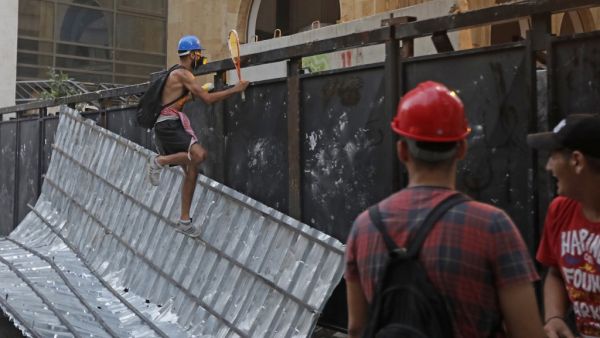Two Lebanese Cabinet ministers, including a top aid to the premier, have resigned amid signals that the embattled government may be unravelling in the aftermath of the devastating blast that ripped through the capital.
The blast killed over 160 and wounded around 6,000, raising public anger to new levels.
The resignation of Information Minister Manal Abdel Samad, in which she cited failure to meet the people's aspirations and last week's blast, was followed by a swirl of reports that other ministers were also resigning.
Late on Sunday, Environment Minister Damianos Kattar resigned, calling the explosion an "enormous catastrophe".
Kattar said he had lost hope in a "sterile regime that botched several opportunities".
Several MPs also quit and local media reported Prime Minister Hassan Diab was mulling announcing the entire government's resignation, a day after protesters briefly occupied and ransacked government ministries.
The political haggling had appeared to put off more resignations, and a Cabinet meeting is planned Monday.
If seven of the 20 ministers resign, the Cabinet would effectively have to step down and remain in place as a caretaker government.
Meanwhile, four more lawmakers announced Sunday they were resigning from the 128-seat parliament, joining four others who declared it earlier.
Parliament is also due to convene later this week.
Violent protests continue
As the political negotiations took place, protesters converged again on the parliament area Sunday afternoon, setting off another night of violent demonstrations.
Hundreds of protesters clashed with security forces, attempting to breach the heavily-guarded parliament. Security forces responded with tear gas and chased the protesters in the streets of downtown, in a smaller repeat of scenes from the night before.
The revelation that Lebanese state officials had long tolerated a ticking time-bomb in the heart of the capital has served as shocking proof to many Lebanese of the rot at the core of the state apparatus.
The disaster has revived anger at a ruling class seen as living in luxury while millions endure job losses, deepening poverty, power blackouts and garbage mountains piling up in the streets.
Direct aid to people
World leaders and international organisations pledged nearly $300 million in emergency humanitarian aid to Beirut but warned that no money for rebuilding the capital will be made available until Lebanese authorities commit themselves to the political and economic reforms demanded by the people.
Over 30 participants to the international conference offered help for a “credible and independent” investigation into the August 4 Beirut explosion, another key demand of the Lebanese crowds who took to the streets Saturday and Sunday.
In a joint statement, donors pledged the assistance would be "directly delivered to the Lebanese population" under the supervision of the UN, in a clear indication that no money is going to the government and its coffers.
The UN said about $117 million would be needed over the next three months for health services, emergency shelter, food distribution and programmes to prevent the further spread of Covid-19, among other interventions.
The final statement also read: “In these horrendous times, Lebanon is not alone."
The teleconference participants promised emergency aid, focusing on medicine and hospitals, schools, food and housing.
French President Emmanuel Macron, whose country once governed Lebanon as a protectorate, said, “We have to do everything we can so that violence and chaos do not win the day."
“The explosion of August 4 was like a thunderbolt. It’s time to wake up and take action. The Lebanese authorities now have to put in place ... political and economic reforms."
Search for a sustainable solution
In the country where civil war raged for 15 years, few, if any, have been held accountable for it and most of the warlords remain in power or leading powerful political factions.
The government, backed by the powerful militant Hezbollah group and its allies, announced it is defaulting on Lebanon's sovereign debt and has since been engaged in difficult, internally divisive talks with the International Monetary Fund for assistance.
The coronavirus restrictions deepened the impact of the economic and financial crisis and fueled public anger against the new government.
Lebanese have criticised Diab's government for being unable to tackle the challenges, saying it represents the deep-seated political class that has had a hold of the country's politics since the end of the civil war in 1990.
In a televised speech Saturday evening and in an attempt to diffuse public anger, Diab offered to propose early parliamentary elections said he was prepared to stay in the post for two months to allow time for politicians to work on structural reforms.
This article has been adapted from its original source.








